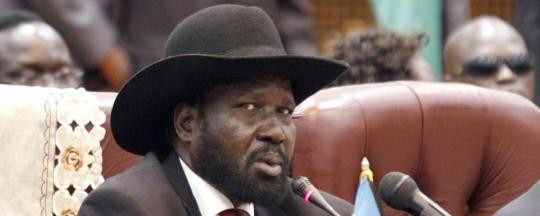South Sudan’s President Salva Kiir on Christmas Eve declared the country’s ten existing states ‘defunct’ and divided them into 28 new states whose governors he appointed from the ranks of his loyalists.
Kiir announced in one decree the “relief of the governors and caretaker governors of the defunct ten states of the Republic of South Sudan” and in another decree the appointment of 28 new governors.
The surprise move appears to violate terms of peace deals signed by the government with both the opposition SSDM/A ‘Cobra Faction’ in May 2014 and with the larger SPLM-IO in August 2015. It also defies opposition to the 28-states plan from some quarters of the ruling party, particularly within the divided Equatorian and Nuer caucuses in parliament.
The May 2014 peace deal with the Cobra Faction provides that the chief administrator and de facto governor of the Greater Pibor Administrative Area shall be a nominee of the Cobra Faction. The position is currently held by ex-rebel leader David Yau Yau, head of the Cobra Faction.
In his decree last night, Kiir appointed Baba Medan as governor of Boma State, which would cover the Greater Pibor Area. Medan, who is currently deputy governor of Jonglei State, is an ethnic Murle like Yau Yau but he is not a member of the Cobra Faction.
The Christmas decrees also break up Unity State and Upper Nile State, which the August 2015 peace deal says must be ruled by SPLM-IO nominated governors. Kiir instead divided these two states into six parts, appointing his own loyalists in each of the new, smaller states.
Members of the SPLM-IO headed by former vice president Riek Machar are notably absent from the list of 28 new governors announced yesterday, in spite of the return this week to Juba of an ‘advance team’ of leaders of the group who had been living in exile in neighboring countries.
Another notable change is the division of the hitherto ethnically mixed Jonglei State into smaller ethnic enclaves and the removal of the Nuer governor John Kong and his replacement by Philip Aguer Panyang, the current SPLA spokesman.
Also noteworthy is the appointment of Elias Waya Nyipuoch, a relative of a former Western Bahr el Ghazal governor, as governor of the new Wau State. Waya is a favorite of Luo community leaders, but not the pick of Balanda or Dinka communities. The outgoing governor, Rizig Zacharia, who is transferred to the governorship of Lol State, recently warned of the dangers of ethnic wrangling among the Luo, Balanda and Dinka over the governorship.
Kiir’s decrees come after a parliamentary struggle in November during which supporters of the 28-states plan sought to modify Article 161 (1) of the Constitution, which says “the territory of South Sudan is composed of ten states.”
In a controversial vote that split the ruling party, MPs on 19 November were asked to change Article 161 and other articles, giving the president powers to divide the states, create new ones, and appoint governors.
Opponents of the 28-states plan said the vote failed to secure the necessary 2/3-majority to become law, but Kiir’s supporters have brushed aside this criticism and consider the bill to have passed. In his decree last night, Kiir referred to the constitutional amendment as law.
The implementation of the 28-states plan has been a priority of Kiir for some time now, since his ‘Establishment Order’ on 2 October, when he sought to establish the new states by decree, without parliamentary approval – a position he later reversed.
The full list of new governors:
1. Achiso Loluko Malik – Imatong State
2. Louis Lobong Lojore – Namorunyang State
3. Africano Monday – Maridi State
4. Joseph Nyigele Pacifo – Amadi State
5. Patrick Rafael Zamoi – Gbudwe State
6. Augustino Jadala Wani – Jubek State
7. Juma Ali Malou – Terekeka State
8. David Lokonga Moses – Yei River State
9. Elias Waya Nyipuoch – Wau State
10. Ronald Ruai Deng – Aweil State
11. Rizik Zacharia Hassan – Lol State
12. Deng Deng Akuei – Aweil East State
13. Bona Pariek Biar – Twic State
14. Abraham Gum Makuach – Gogrial State
15. Akech Tong Aleu – Tonj State
16. Rin Tueny Mabor – Eastern Lake State
17. Abraham Makoi Bol – Western Lake State
18. Madhang Majok Meen – Gok State
19. Dr. Joseph Nguen Monytuil – Northern Liech State
20. Taker Riek Dong – Southern Liech State
21. Mayol Kur Akuei – Ruweng State
22. Philip Aguer Panyang – Jonglei State
23. Dr. William Othon Awer – Western Nile State
24. Chol Thon Balok – Eastern Nile State
25. James Kok Ruai – Western Bieh state
26. Peter Bol Kong Ngoth – Eastern Bieh State
27. Peter Lam Both – Latjoor State
28. Baba Medan Konyi – Boma State
Dr Lam Akol, head of the SPLM-DC opposition party, described the appointment of 28 governors as unconstitutional and said it could jeopardize the compromise peace agreement.
“The most serious effect is it is going to impair the peace agreement and we don’t know what will be the direction of the rest of the parties,” Lam said. “It is one side now violating the peace agreement in a very substantial manner.”
Lam urged the guarantors of the peace agreement to pressure the government to reverse the decision.
Related coverage:
What steps are needed to create 28 states in South Sudan?
Has South Sudan’s constitution been changed or not? (Podcast in Arabic)
Map analysis: Ethnic balance to change if 28 states approved
Decree creates ethnic enclaves for Nuer




